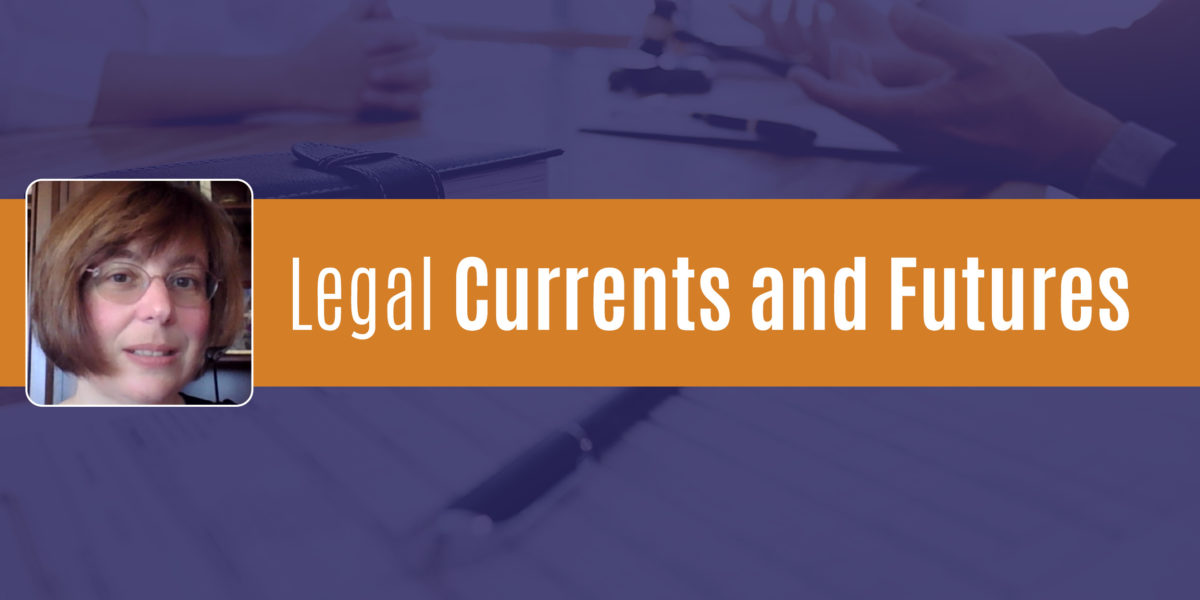Jeanne Eicks, J.D., associate dean of Graduate and Lifelong Learning Programs at The Colleges of Law, sets the stage for a new blog series: Legal Currents and Futures.
The legal industry and legal professionals face some thorny social and business challenges. Some readers will be familiar with the Legal Services Corporation’s 2022 Justice Gap Report which revealed that 92% of low-income Americans have had little or no legal assistance for their substantial civil legal problems. Furthermore, according to Rebecca Sandefur’s work in 2016, two of the most important reasons that people do not take their civil justice situation to a lawyer is because they do not understand that their issues are legal or consider law a solution. These two dire facts reflect a failure of the legal profession to reach all of those with civil legal needs with their services, due in part to lawyers’ notorious reluctance to embrace change as well as other operational and business-related barriers. Between citizens’ limited access to legal services, and their understanding of the role of law in resolving problems, as well as lawyers’ and the legal industry’s reluctance to embrace change, the legal industry needs fresh ideas and approaches to solve these and other longstanding issues.
In the legal profession we march to the beat of a precedential drum. That steady drumbeat has supported stability and the status quo, over time leading to mediocrity and, at times, atrophy in the legal industry. We need fresh ideas, and what better place to get those ideas than from those who represent the future of the legal industry – guest bloggers and students. Our blog series will champion offbeat rhythms and the occasional riff off ideas of other industries knowing that change can come with discomfort in the short term.
Thinking about this series and leaning into the idea of shorter and more timely articles, my mind filled with notions of brief academic opinion pieces about access to justice, legal business, and legal technology that would be thought provoking and perhaps a bit edgy. My students and I plan to post periodically with the goal of weekly posts during the semester. We will invite posts from others in the community. Our posts will confront current issues facing legal clients, legal practitioners, and the legal industry; herald interesting new ideas; and relate the outcomes of changes, all with an eye toward possible legal futures.
This blog series will not be solely optimistic about changes to legal—grand ideas fail for many reasons. Failures often teach more than successes (see our next blog about the DoNotPay fiasco), and our blog will seek lessons from failures. This blog series has a plan and needs a title to capture what we want to do. Here’s the short list of lofty goals for this blog:
- Boost the signal of ideas, ours or others, that could reshape the legal industry with priority given to the following goals or impacts:
- Enhance legal representation for the underserved and unserved
- Deliver client-centric, accessible, well-designed legal services
- Improve citizen education about the law and its power to change lives
- Expand understanding of the value proposition of active collaboration with all professions
- Rethink regulations and standards, explicit and implicit, governing the legal industry
- Dispel lingering myths and fears about change and technology within legal
- Provide law students an accessible forum for thoughtful academic publication considerate of their life commitments.
Responsible creativity. Rational risk-taking. Testing the unknown. This blog will be a place to think about, propose, and discuss the upcoming and possible in legal, legal currents and futures.
________________
Jeanne Eicks, J.D., is the associate dean for Graduate and Lifelong Learning Programs at The Colleges of Law. With the goal of preparing students for careers that routinely intersect with the law—but do not require a law license—she has championed the development of the Master of Arts in Law program at The Colleges of Law.
About the Master of Arts in Law program
The M.A. in Law program prepares professionals for careers that routinely intersect with the law but do not require a J.D. or legal license. Students in the program can customize their education based on their professional interests, choosing from courses in business operations, entrepreneurship, emerging law, technology, and others.
Learn more about the M.A. in Law program by completing the form below.

